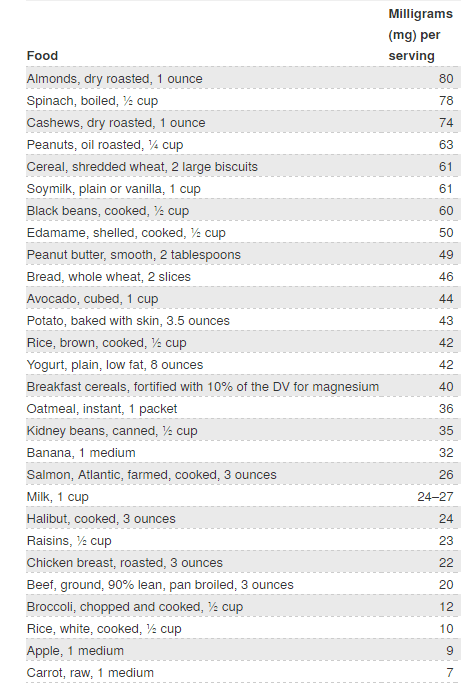By Valerie Robitaille
Magnesium is an essential macromineral, which means it must be supplied regularly from your diet in sufficient amounts. Magnesium is the fourth most abundant mineral present in your body, and drives approximately 300 enzyme functions, including energy production. Magnesium-rich foods include dark green vegetables, nuts, beans and whole grains; eating plenty of these is necessary for the prevention of many diseases and optimal health.
1) Your heart needs magnesium to function; while calcium provides the stimulus for each heartbeat, magnesium allows the cells to relax by removing calcium. If it were not for this relaxing effect of magnesium, your heart would be in an excited state continuously. If you have an abnormal heart rhythm, your health provider can check your serum magnesium and suggest an appropriate supplemental dose if found to be low.
2) If you have problems falling asleep or wake up often during the night, magnesium supplementation may provide the relief you have been looking for. “According to Balch and Balch, millions of people have trouble getting to sleep due to a condition commonly known as restless leg syndrome.” A high-quality supplement that includes 1,500 mg of calcium and 1,000 mg of magnesium is generally suggested.
3) “According to the National Institutes of Health, approximately 50 percent of the magnesium in your body is found in the skeleton, or bones.” Calcium is often promoted as the No. 1 preventive factor in osteoporosis, but magnesium also plays a significant role in maintaining strong bones.
4) Although scientific studies have been inconclusive regarding the efficacy of magnesium supplementation for the treatment of migraine headaches, many sufferers have found relief through prevention by supplementing with magnesium and riboflavin, or vitamin B2. Processed food impairs magnesium in the body and eliminating these may be your first step in migraine relief.
5) Due to magnesium’s ability to be absorbed through the skin, its sulfate form — Epsom salt — has been used for centuries to help detoxify the body, reduce swelling and relax the muscles when used as a soak. Simply add 1 to 2 cups to hot running water and remain in tub for 20 minutes. This practice is also beneficial for individuals with sleep problems. For sprains, consult directions on the package.
List below shows magnesium per serving of selected foods in descending order. Many foods very high in magnesium are not shown, for example beets and all green leafy vegetables:

• new findings about magnesium and cholesterol
• improved methods for intake and absorption
• how calcium can increase the risk of heart disease—and how magnesium can lower it
• magnesium-rich eating plan
• the link between magnesium and obesity
• vitamins and minerals that work with magnesium
AVAILABLE ON AMAZON CLICK HERE
